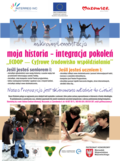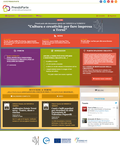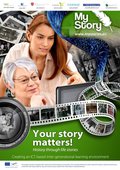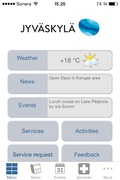Project Overview
European citizens do not participate equally in the Information society: in fact, the digital gap is moving down from infrastructures to uses. Based on this observation, local authorities in Europe have developed Digital Public Spaces (DPS) promoting e-inclusion.
Tags
News
28/08/2015
The 7th European Innovation Summit, organised by Knowledge4innovation, will take place from 7-10 December 2015 in the European Parliament in Brussels.
25/08/2015
The Interreg Europe programme financed by the European Regional Development Fund (ERDF) aims to improve the implementation of regional development policies and programmes, in particular programmes for Investment for Growth and Jobs and European Territorial Cooperation (ETC) programmes. By co-financing projects and four thematic platforms it allows regional and local public authorities and other players of regional relevance across Europe to exchange practices and ideas on the way public policies work, and thereby find solutions to improve their strategies for their own citizens.
22/01/2015
‘Digital native’ is a term increasingly used in public discourse to describe the generations of young people who grow up surrounded by digital technologies.

12/12/2014
The component 4 of ecoop aimed to act as a field research add-on to the work carried out within Component 3 (exchange of experience) supporting the E-coop methodology. A micro-implementation organized within C4’s scope is understood as a practical testing of the E-coop concept. It implied partial or total transfer of BP identified through C3 within a voluntary territory in Poland.

11/12/2014
Creating better possibilities for citizen participation through digital means has been the main target for Jyväskylä in the E-COOP project. To reach this goal, different kinds of solutions have been designed for the city website.

11/12/2014
E-COOP project Final interregional conference “DIGITAL COOPERATIVES – the European experience of a digital society” Wednesday 5 November 2014, Cripps Court Magdalene College, Auditorium, CAMBRIDGE
11/11/2014
Marianne Baudouin, the lead partner of the project and Rebecca Morgan, the host of the final conference having an interview in Magdalene College Cambridge on 05/11/2014. http://youtu.be/Tes9ths493M

29/09/2014
The following practice is an indicative example of the missions, budgets and training for intermediaries to public e-services.

29/09/2014
This third thematic brochure is a result of the shared analysis operated by the E-COOP project partners about the evolution of “digital mediation” policies. It focuses on the coproduction of public services through digital cooperation.

29/09/2014
“DIGITAL COOPERATIVES – the European experience of a digital society” CAMBRIDGE, Wednesday 5 November 2014 This conference is organised in the frame of the EU cooperation project “E-COOP / Digital cooperatives”, which will end in December 2014 after three years of implementation.

16/09/2014
Dymi is a rural municipality located 22 km south-west of Patras in Greece. According to the census in 2001 the population totals 10,955 with some 47% of those living in the coastal area. The Municipality of Dymi is keen to improve local development. And has supported initiatives such as the Telecentre.

16/09/2014
Bct is the multimedia public library of the City Council of Terni and a youth magnet as it has now come to represent the most burstling meeting place for young people for study leasure as so forth.

05/09/2014
PrendoParte is an online platform created for the democratic participation of the citizens of Terni municipality. It has been realized within the European Interreg IV- E-Coop project where 12 member states worked in close cooperation and in a proactive exchange to the development of public digital spaces”.

03/07/2014
Nádasdy Ferenc Museum in Sárvár has created a web2.0 surface on its website www.sarvaranno.hu with the aim of collecting knowledge about the past of Sárvár with the contribution of the users.

03/07/2014
MyStory good practice has developed an ICT-based solution to empower seniors to learn basic technical skills via intergenerational learning, to gain access to new learning opportunities and to make contact with people who are potentially at risk of social exclusion.

03/07/2014
The following practice is an indicative example linked to the thematic “Missions, budgets and training for intermediaries to public e-services”.







